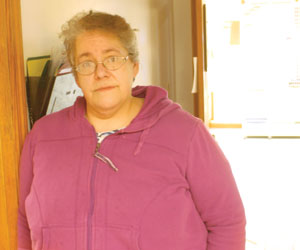
February 10, 2015
Woman shares perspective on compulsive lifestyle
 Emmett Neno/Contributing photographer
Emmett Neno/Contributing photographerKelley Whitter, 49, of Cortlandville, fell prey to what officials identify as “animal hoarding.”
CORTLANDVILLE — Kelley Whitter, 49, felt trapped. Each day, she would give up things she enjoyed to spend all her time feeding her increasing number of cats and cleaning up the messes they made.
Still, she felt as though she kept falling further and further behind in the cycle. It eventually felt pointless to get out of bed, and she said she began to think about suicide.
Now that she has been going through counseling and homes have been found for her cats, which numbered over 50 when they were finally removed by humane society officials this fall, Whitter said she is starting to recover, one day at a time.
“I can actually make plans (now),” she said. “I have choices now. I didn’t feel like I had choices before.”
Whitter fell prey to what officials identify as “animal hoarding,” a situation she became ensnared in through a chain of circumstances and one she says she could not escape from without outside help.
Animal hoarding is a compulsive habit that a person can develop with good intentions but one that can hurt the individual and the animals they adopt, officials say.
Bill Carr, an investigator with the Cortland Community Society for the Prevention of Cruelty to Animals, came to Whitter’s mother’s house Oct. 9. to assist in removing the cats as well as Whitter’s 11 Pomeranian dogs and parrot. Most of the cats were later relocated to farms and rural homes while a few were put down. The dogs and the parrot remain at a boarding house while repairs are made to the house, Whitter said.
Carr said he deals with one or two such cases of animal hoarding each year. In his experience, people usually adopt an animal or two because they want to help them but then gradually become convinced they are the only one who can assist that pet.
Whitter’s story started when she adopted a cat named Maggie, she said. She was employed as a dog groomer at a business in Manlius, a job she held for various veterinarians and businesses for over 20 years, when Maggie first arrived at Whitter’s mother’s home with five kittens. Whitter had the kittens neutered, but the cat later had four more kittens that began to reproduce when she was recovering from surgery in April 2008 and 2009, Whitter said.
“Your world shrinks,” she said, as she described cleaning a room only to return 20 minutes later and find it messy again.
The cats would chew on potted plants and tear apart insulation in the unfinished basement, Whitter said. She never felt she could get ahead of the responsibility of feeding and cleaning up after the animals.
She did not contact the Cortland Community SPCA for help because she was afraid they would kill the cats, Whitter said.
Instead, she attempted to handle the problem herself by finding homes for her cats as best she could, she said. Whitter eventually quit her job so she could have more time to work on the problem that faced her.
“I kept trying to fix it,” she said. “I just could never fix it enough.”
Carr said he’s found people in similar situations are reluctant to ask for help due to embarrassment or shame.
“They know something is not the way it is supposed to be, and they are ashamed of it and don’t want people to know it,” he said.
This lifestyle, if uninterrupted, can endanger the animals, the residents and first responders through exposure to the ammonia in the animals’ urine, which can cause severe respiratory problems, Carr said. The sheer number of animals collected also can tax the SPCA’s resources as well, he said.
Carr said he has found that past traumatic events or physical or emotional problems that a person has not resolved can trigger animal hoarding as a person turns to pets for comfort. One man he encountered previously who was engaged in hoarding animals was an alcoholic and had never dealt with the death of his father, he said.
Whitter says she is now on the road to recovery as she works through her struggles.
She is now working again at the dog grooming business in Manlius where she was previously employed, and she is going to counseling.
It still hurts to have given up her cats, but she is doing better, she said, adding she wants others to know officials will assist them if they seek help.
“It’s such a relief not to have anything to hide,” Whitter said. “It’s a weight that’s gone.”
Officials at the SPCA said they can see a difference in Whitter as well.
Carr said he is encouraged because he had never seen someone in a similar situation recognize there was a problem with their lifestyle and fix it. Bob Eckard, the executive director of the SPCA, said he could tell that Whitter is no longer stressed and has a healthy mental outlook now.
“And I think that’s super,” he said. “She’s got this beat.”
To read this article and more, pick up today's Cortland Standard
Click here to subscribe